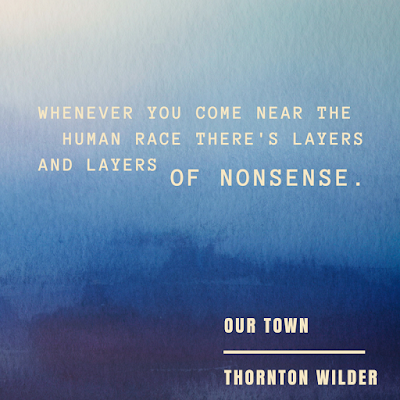Opening our 2017 season is Thornton
Wilder’s The Skin of Our Teeth, which
the playwright himself called “The most ambitious project I have ever
approached.”
 |
| The original Broadway poster for The Skin of Our Teeth, 1942. |
Relishing in staging the seemingly absurd
and impossible, the play centers on an outwardly normal suburban family from
the fictional town of Excelsior, New Jersey. It soon becomes apparent, however,
that the world of the Antrobus family is anything but normal: dinosaurs prowl through the living room, characters address the audience,
backstage crew enter and speak, and the set is disintegrating. This “so-called”
New Jersey is merely the starting point for navigating 5,000 years of family
antics and apocalyptic disasters. Through an Ice Age, Flood, and World War, the
play’s title (Job 19:20 I am escaped with the skin of my teeth)
makes the point clear: no matter how narrow the escape, the human race
survives.
Simultaneously taking place in contemporary
and prehistoric times, the set-up can sound confusing until considering another
“modern stone-age family”. The
Flintstones (1960’s) was a clear cave-man take on the popular family sitcom
The Honeymooners (1950’s). Though the
cartoon was both an absurd and satirical social commentary, it only takes the
intro for The Flintstones to make
sense. The Skin of Our Teeth invites
audiences into a similar situation: Biblical archetypes mix
with mid-century American dynamics to create something absurdly silly and still profoundly
compelling. Instead of cartoons, the zaniness is theatre itself. The characters
in The Skin of Our Teeth are actors
putting up ‘The Skin of Our Teeth’, and regularly step out of character to
complain about their roles or whenever the play feels particularly
incomprehensible. With innocent and childlike disruptiveness, Wilder explodes ideas and characters not strictly confined to literal time. With
little control over where we’ve been, where we’re going, or what might
happen to us along the way, the audience (like humanity) is meant to
hang on for the ride and get through it together.
Wilder had firmly established his literary
reputation as a novelist with his immensely popular, The Bridge of San Luis Rey (1927), which won his first Pulitzer
Prize. In the 30’s, he began writing plays for Broadway and utilizing unusual
structures and techniques. Our Town
(1938), his best-known and most frequently performed work, broke ground with
its bare stage setting and time navigating narrator. Earning Wilder his second
Pulitzer Prize, it also demonstrates his long-standing fascination with the
effects of the passage of time on individuals and societies. That preoccupation
also surfaces in The Skin of Our Teeth,
which emerged onto stages just as America (and Wilder himself) entered World
War II. He later reflected that “It was written on the eve of our entrance into
the war and under strong emotion, and I think it mostly comes alive under
conditions of crisis.”
He was writing
it as the world was descending into chaos. I think everybody was wondering:
“Will we get through this? And if we do, what then? Will we learn anything?
Will we grow or change or do it better the next time?"... The characters are
continually hitting rock bottom and then finding a way – and it’s usually with
the help of other people – to have the hope to move forward, despite the
catastrophic situation that is facing them in that immediate moment.
- Arin Arbus
 |
| Three time Pulitzer Prize winning novelist & playwright, Thornton Wilder. |
One of the toughest and most complicated
minds in American Theatre, Wilder’s plays have so affected theatre tradition that
few serious dramatists ignore them. Their singular humanity and artistic vision continue to resonate well beyond his
time.
Any play with
three apocalypses, talking dinosaurs, and characters who refuse to say their
lines is clearly aiming high. But when that play has a housemaid tell us in her
opening speech that it will address all “the troubles the human race has gone
through,” it may seem destined for ambitious failure. The Skin of Our Teeth, however, succeeds. A vast, symbolic play
about all of humanity, Thornton Wilder’s masterpiece is also a witty,
compassionate look at the struggles of a single family. Sure, the Antrobus clan
(whose name derives from the Greek for humanity)
may weather the calamities of ice ages, floods, and wars, but they also face
the struggle of raising children, going to work, and trying to stay faithful
for five thousand years. With staggering imagination, Wilder reminds us that
the destruction and rebirth on his stage take their shape from the cycle of our
own lives. It’s no accident that Sabina, the saucy housemaid who directly
addresses us with her analysis of the play, closes by insisting, “We have to go
on for ages and ages yet.” Onstage or off, she’s telling us, we’re all enduing
the same old thing.
- Mark Blankenship
Notes on the End of the World, The Thornton Wilder Society
Join us at the end of this month as we attempt to stage the survival of the entire human race. It's a rare and exciting opportunity to catch 'The Skin of Our Teeth', at Rosebud Theatre, March 31 - June 3. For tickets and further information, visit rosebudtheatre.com


No comments:
Post a Comment